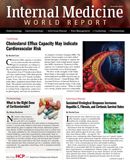Publication
Article
Internal Medicine World Report
Exciting Insights into Key Clinical Questions
Author(s):
In this month's issue of Internal Medicine World Report (IMWR), we present summaries of highly relevant studies in the areas of cardiology, pulmonology, gastroenterology, infectious disease, psychiatry, and neurology. Selected by our physician editor for their relevance to the practice of internal medicine, each study addresses a key clinical issue that can have a significant impact on patient care.

In this month’s issue of Internal Medicine World Report (IMWR), we present summaries of highly relevant studies in the areas of cardiology, pulmonology, gastroenterology, infectious disease, psychiatry, and neurology. Selected by our physician editor for their relevance to the practice of internal medicine, each study addresses a key clinical issue that can have a significant impact on patient care. Our writers have provided concise summaries of the key aspects and findings of each study, enabling readers to quickly ascertain the relevant facts. We have also provided links to the source materials to facilitate deeper reading.
In the “Cardiology” section of this issue, we highlight results from a study conducted by researchers at UT Southwestern Medical Center that indicate that cholesterol efflux may be a superior indicator of cardiovascular risk and a better target for therapeutic treatments than standard measurements of HDL. In their investigation of the relationship between HDL function and cardiovascular disease, the researchers reported finding “a strong, graded, protective relationship between cholesterol efflux and incidence of cardiovascular events among people who were free from heart disease at baseline testing.” These results are particularly interesting in light of recent studies showing little or no correlation between increases in HDL and reduction in cardiac events.
In the “Pulmonology” section this month, we highlight a study that looked at some of the evidence supporting the use of systemic corticosteroids in patients with COPD in the ICU. The authors reported that the optimal systemic corticosteroid formulation, dose, route of administration, and treatment duration are unclear, though there is some evidence suggesting that lower doses of corticosteroids in these patients may be associated with more favorable outcomes. The authors call for additional studies on this matter, but note that it could lead to substantial reductions in health care expenditures if further evidence should be found that supports the use of lower doses of corticosteroids.
Irritable bowel syndrome with diarrhea (IBS-D) is a frequently seen condition in the internal medicine setting. This condition can have a significant impact on patients’ quality of life, underscoring the importance of early diagnosis and treatment. In the “Gastroenterology’ section of IMWR this month, we have included a study that looked at the effects of treatment with ondansetron vs. placebo in a group of patients diagnosed with IBS-D. In this crossover study, after 5 weeks of treatment, patients who received ondansetron reported significantly improved stool consistency, fewer days with urgency, less frequent defecation, and less bloating compared with their counterparts who received placebo.
With the flu season upon us, and amid reports that this year’s flu vaccine may not be as effective as previous year’s formulations, it is likely patients may ask about the use of over-the-counter treatments such as zanamivir and oseltamivir. A study in this month’s “Infectious Disease” section has some bad news for patients seeking relief from flu symptoms: neither of these treatments has much of effect. Study results showed that both reduced the time to symptomatic improvement by only about a half a day (and that performance may have been “attenuated by other symptom relief medication.” Clinicians and their patients should carefully weigh the trade-offs between potential harm and benefits when deciding whether to use these remedies.
Several studies have shown that medication management in conjunction with psychotherapy often produces the best outcomes in patients who have been diagnosed with major depressive disorder (MDD). A study in the “Psychiatry” section this month compared the effectiveness of treatment with cognitive behavioral therapy in combination with antidepressant medication to that of treatment with antidepressant medication alone in with chronic or recurrent MDD. Patients on combination therapy experienced improved recovery rates and fewer serious adverse events. Interestingly, the authors noted that this synergistic remedy will improve symptoms for only about one-third of patients because cognitive therapy engages different mechanisms than antidepressant medication, but likely only in some patients.
Finally, the “Neurology” section offers an interesting study in which investigators looked at patients with prefrontal lesions (PFL) and those with the behavioral variant of frontotemporal dementia (FTD) and compared their moral judgments to those of a control group by asking them to perform a task designed to disentangle the contributions of intentions and outcomes in moral judgment. Both groups of patients judged situations in which protagonists believed that they would cause harm but did not as being more permissible than the control group. According to the authors, this study appeared to be the first to directly compare a social cognition domain in 2 frontal pathologies with different etiologies. The study results highlighted the importance of comparing patients with vascular lesions and patients with neurodegenerative diseases.
Please read through these studies and let us know if your clinical experience confirms, contradicts, or differs from the conclusions reached by the investigators. As always, we are interested in your feedback as to how we can improve the content offered in IMWR. We are also looking for potential contributors and writers who want to share their knowledge and experience with their colleagues in internal medicine. Write to us at Editors@hcplive.com.
Thank you for reading.
Mike Hennessy
CEO & Publisher






